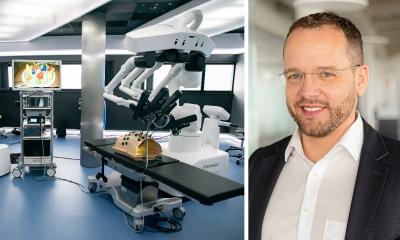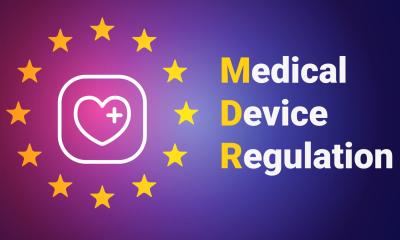
Image source: Shutterstock/vchal
Article • A painful divorce
Post-Brexit worries for UK healthcare
Brexit could have a potential impact on healthcare delivery across the UK, according to an expert in the field. Dr Hugh Harvey believes that will be particularly noticeable in the area of Medical Device Regulation (MDR), with the UK and Europe seemingly going in different directions on the subject after the UK left the European Union (EU) at the end of last year.
Report: Mark Nicholls

The EU updated its MDR on May 26, but the UK has yet to make firm commitments, leaving uncertainty for medical device manufacturers and NHS procurement teams. He remains concerned that this could impact the availability of some medical devices in the future in the UK as non-UK firms may choose not to go through the regulatory process that Britain adopts.
Dr Harvey, who is managing director of Hardian Health, will outline his thoughts in his presentation to the British Institute of Radiology congress in November offering an “update on post-Brexit regulation for healthcare specialists.” He said: “The timing of Brexit has created a disjointed regulatory landscape for the UK. Because we left five months before Europe updated their regulations, we have lurched into a ‘grey zone’ where Europe is now ahead of the UK in terms of regulations. Some people see this as an opportunity to create better regulations, however others see it as creating a two-tier regulatory system where we have different regulations for the UK versus Europe. That can have issues for market access.” With neither healthcare procurement teams in the UK, or manufacturers, wanting to have to go through regulations twice, he said it is important “to look at the pros and cons of the situation and potential ways forward.”
Recommended article

Article • Medical device regulation revision
MDR: The UK goes it alone
With new Medical Device Regulations (MDR) now in force across Europe, the UK has chosen to retain pre-existing rules while also introducing mechanisms to allow it to draw up separate rulings for the sector in the future. The MDR took effect on May 26, aiming to harmonise and strengthen the pre-existing regulatory regime for medical devices, and enhance protection for consumers.
The main objective of Europe’s new MDR is to ensure efficient and safe medical devices for use in healthcare and bring more transparency for healthcare professionals. Meanwhile, the UK government has chosen to retain pre-existing rules while giving itself the flexibility to take a divergent position to the EU with respect to medical devices after passing the Medicines and Medical Devices Act 2021.
While healthcare specialists may not need to take action immediately, Dr Harvey warned that the medical device landscape could change in the future. “Some medical devices, which were European approved and certified, may disappear from the UK market because manufacturers may not want to go through the regulatory process for a small market,” he said.
I would like to see harmonisation between European and UK regulations, or potential harmonisation with other global regulations, for example, with America and the FDA
Hugh Harvey
For healthcare professionals in the NHS, that will mean taking a longer term look at what they are buying in terms of hardware devices and software and speaking to manufacturers about their regulatory strategy going forward, and whether they plan to maintain a presence in the UK market. “At the moment we are in a transition zone where UK will accept Europe’s CE mark for a period of time but at some point, that will disappear,” he added. He believes that if there is to be closer alignments, the move will have to come from the UK as Europe has already introduced new MDR. “It is up to the UK to decide what they will do but I would like to see harmonisation between European and UK regulations, or potential harmonisation with other global regulations, for example, with America and the FDA.”
He suggests mutual recognition between the UK and America may be an interesting step, but emphasises that the UK must have some alignment strategy as it is “too small a market to set its own standards.” But there could still be an impact. “In a worst-case scenario, some medical devices may come off market and UK hospitals may need to change brands,” said Dr Harvey. “There are wide-ranging implications as all health areas will be affected; literally any product that is used in a hospital is going to be a medical device and could be anything from software to hardware, or rubber gloves to CT scanners.”
While there are government-level discussions taking place on these regulations, he warns it is going to be a long and slow process.
*The British Institute of Radiology congress takes place in a virtual format on November 4 and 5 (www.bir.org.uk). “Update on post-Brexit regulation for healthcare specialists” (Hugh Harvey) is at 10.30am on November 4.
Profile:
Dr Hugh Harvey is managing director of Hardian Health and an experienced clinician and health technology advisor, with a focus on leveraging big data and artificial intelligence. He is a board-certified consultant radiologist and academic, trained in the NHS and the Institute of Cancer Research. He was a co-opted member of the Royal College of Radiologists informatics committee and sat on their AI policy reference group.
02.09.2021









